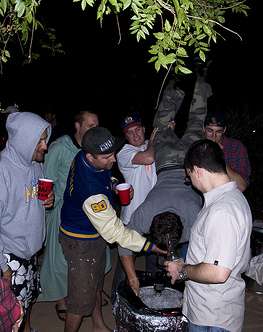What is binge drinking? While the specific definitions vary, the general definition of binge drinking is when someone drinks a large amount of alcohol in a short duration of time for the purposes of getting drunk.
Of course in the real world, there are many different ways we can define binge drinking – depending on who you ask, the definition of binge drinking can vary.
Some measures of binge drinking look to the number of drinks, others look to blood alcohol levels, and still others take a holistic approach to defining binge drinking by looking at a person’s behavior.

Contents
What’s The Definition Of Binge Drinking?

A keg stand – a classic trademark of college binge drinking (John Penny | Flickr)
The actual amount of alcohol you need to drink in a session for it to be classified as binge drinking varies depending on who you ask, but the general definition is approximately 8 units of alcohol (around 3 pints of strong beer), and 2-3 units of alcohol for women (around 2 large glass of wine) consumed in a short period of time.
However, these numbers are far from accurate, and in the real world, binge drinking is better defined by the level of intoxication than the quantity of alcohol. The National Institute on Alcohol Abuse and Alcoholism (NIAAA) defines binge drinking as “a pattern of drinking that brings a person’s blood alcohol concentration (BAC) to .08% or above”.
In layman’s terms, if you’re drinking to “get hammered”, you’re binge drinking.

Alcohol Abuse vs. Addiction
Before we go on, we should re-iterate the difference between alcohol abuse and alcohol addiction. Alcoholism/addiction is about dependence alongside abuse, while those who abuse alcohol aren’t necessarily dependent on alcohol, but they experience negative consequences as a result of their drinking patterns. This abuse usually comes in the form of binge drinking.
Its also worth noting that individuals who binge drink are not necessarily alcoholics or even alcohol abusers. However, virtually everyone with an alcohol problem will binge drink.
For some problem drinkers who abuse alcohol, but don’t suffer from serious alcoholism (yet), cutting out binge drinking and learning to drink in moderation can be enough to avoid major problems with alcohol down the road.
What Are The Effects Of Binge Drinking?
Numerous studies have confirmed that drinking large amounts of alcohol in single drinking sessions is more harmful to your health than drinking smaller quantities on a regular basis.
In many countries, binge drinking is considered an acceptable social activity among young professionals and college age kids. In fact, regular binge drinking is often seen as a rite of passage into adulthood. However it’s far from 100% safe. Getting extremely drunk can negatively affect both your physical and mental health:
- Binge drinkers exercise extremely poor judgment and aggression. Binge drinkers often make poor decisions they wouldn’t make when sober or when drinking within their limits. This can include drinking and driving, assault, petty mischief, risky sexual behavior, and aggressive behavior Studies have shown that alcohol is a factor in 1 out of every 3 sexual assaults, 1 out of 3 burglaries, and half of all street crimes.
- Accidents and falls are common. This is due to the severe effects intoxication has on judgment, motor skills and balance.
- In rare instances, binge drinkers can experience fatal alcohol poisoning. Binge drinkers are also susceptible to choking to death on their own vomit if they pass out on their back – if you’re caring for someone who’s passed out drunk, always make sure to keep them face down.
- Binge drinking is a gateway to long term abuse and addiction. Everyone who has ever abused alcohol or become an alcoholic has binged. This doesn’t mean binge drinking causes alcoholism, after all, most binge drinkers are functional members of society. However, for those who with addictive tendencies or for whom alcoholism runs deep in the family, avoiding binge drinking sessions may be a way to avoid plunging into the trap of alcoholism in the first place.
- Binge drinking can cause depression in some individuals, especially when its used as a way to mask emotional pain.
- Regularly engaging in binge drinking poses long term health risks, including increased risk of stroke, cardiovascular disease, liver disease, and high blood pressure.
Should I refrain from Binge Drinking altogether?
If you have problems with alcohol, then yes, binge drinking is a definite no-no. But for any young college age kids reading this, I can’t really stand here and tell you not to do it – that’s your choice to make. Many young adults get hammered on weekends and have a great time. While this often results in blackouts, painful mornings, day-after regrets – for many, these mistakes are a rite of passage.
I had a great time partying and drinking in college and quite a bit afterwards. Obviously, things started going south for me at some point, but I have plenty of friends who party and binge on occasion, yet do so responsibly and live perfectly productive lives with no alcohol tolerance or abuse problems.
I can’t tell you not to binge drink, however, I can tell you that it’s not without its risks. I can tell you to be careful and realize that even though you’re young – you’re not superhuman. Accidents and mistakes do happen, and some of these accidents and mistakes can have permanent, life changing consequences. Sometimes, all it takes is 1 night to change your life forever.
If you’re going to binge drink, do it as responsibly as possible. Also, pay attention these warning signs that might tell you when your weekend social binge drinking has morphed into a serious alcohol problem:
- The consequences of a wild night out are continuously escalating
- You start to binge drink more and more often
- You’re running into problems with the law
- You’ve had a pregnancy scare
- You drink and drive
- You never go more than a couple weeks without binge drinking
- You’ve passed out somewhere with no one to look out for you
- You’ve vomited in your sleep
- You’re racking up credit card debt to afford your bar-hopping habits
- You have unprotected sex
- Friends/family have confronted you about your drinking
- You binge drink on your own (big red flag here)





{ 0 comments… add one now }
You must log in to post a comment.